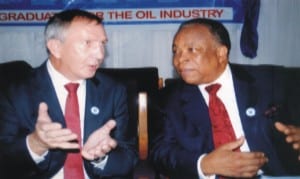Oil & Energy
Pipeline Contract: Community Gives FG, NNPC Ultimatum
The Urhobo Ethnic
Nationality, one of the oil and gas communities in Delta State has issued a one-week ultimatum to the Federal Government, the Nigeria National Petroleum Corporation (NNPC) and the Nigeria Petroleum Development Company (NPDC) to approve the pipeline surveillance contract due to the Urhobo nation else they would no longer guarantee the safety of oil and gas facilities in the area.
This threat was contained in a press statement by the group and the President General/Chairman, Oil Producing/Impacted Communities of Urhobo Nation Friday at Udu, headquarters of Udu Local Government Area of Delta State.
The statement which was signed by Comrade Efe Okovwurie, Moriss Idiovwa, Mrs Mary Otikiri, Hon Kingsley Akpenimor, Chairman Urhobo HOST COM, Coordinator Urhobo Ethnic Nationality, as well as women and youth leaders respectively of HOSTCOM, vowed to resist any attempt to employ any contractor from outside Urhobo nation to handle surveillance and intelligence gathering for oil and gas facilities located in Urhobo communities.
At the expiration of the one week, the statement said, if the Urhobo portion of the surveillance contract is not approved to them, they would withdraw their indigenes working in all the oil and gas facilities across the Urhobo nation and from then onward not guarantee the protection of the facilities.
The statement alleged that the first phase of the surveillance contracts had no impact on the oil bearing communities because those recruited were from the urban areas where the facilities are not located while others were recruited as ghost workers.
“The contractors recruited ghost workers, hence the communities are insisting that the Urhobo portion of the pipeline surveillance that cuts across over eight local government areas in Urhobo land must be given to the company jointly owned by the oil bearing communities so that the indigenes of the communities living with the facilities in their backyard can equally be involved as workers, monitors, supervisors and advisers”, the statement said.
It further revealed that some persons who benefited from the first phase of the contract had hired and mobilised some Urhobo youths to Abuja for a protest on how to secure the contract, the statement stressed that the host communities did not mandate the protest on their behalf and advised the Federal Government and authorities of both NNPC and NPDC not to listen to the protesters and their sponsors.
Chris Oluoh
Oil & Energy
NCDMB Unveils $100m Equity Investment Scheme, Says Nigerian Content Hits 61% In 2025 ………As Board Plans Technology Challenge, Research and Development Fair In 2026

Oil & Energy
Power Supply Boost: FG Begins Payment Of N185bn Gas Debt

In the bid to revitalise the gas industry and stabilise power generation, President Bola Ahmed Tinubu has authorised the settlement of N185 billion in long-standing debts owed to natural gas producers.
The payment, to be executed through a royalty-offset arrangement, is expected to restore confidence among domestic and international gas suppliers who have long expressed concern about persistent indebtedness in the sector.
According to him, settling the debts is crucial to rebuilding trust between the government and gas producers, many of whom have withheld or slowed new investments due to uncertainty over payments.
Ekpo explained that improved financial stability would help revive upstream activity by accelerating exploration and production, ultimately boosting Nigeria’s gas output adding that Increased gas supply would also boost power generation and ease the long-standing electricity shortages that continue to hinder businesses across the country.
The minister noted that these gains were expected to stimulate broader economic growth, as reliable energy underpins industrialisation, job creation and competitiveness.
In his intervention, Coordinating Director of the Decade of Gas Secretariat, Ed Ubong, said the approved plan to clear gas-to-power debts sends a powerful signal of commitment from the President to address structural weaknesses across the value chain.
“This decision underlines the federal government’s determination to clear legacy liabilities and give gas producers the confidence that supplies to power generation will be honoured. It could unlock stalled projects, revive investor interest and rebuild momentum behind Nigeria’s transition to a gas-driven economy,” Ubong said.
Oil & Energy
The AI Revolution Reshaping the Global Mining Industry

-

 Politics5 days ago
Politics5 days agoEFCC Alleges Blackmail Plot By Opposition Politicians
-
Business5 days ago
AFAN Unveils Plans To Boost Food Production In 2026
-

 Sports5 days ago
Sports5 days agoJ And T Dynasty Set To Move Players To Europe
-
Politics5 days ago
Datti Baba-Ahmed Reaffirms Loyalty To LP, Forecloses Joining ADC
-
Business5 days ago
Industrialism, Agriculture To End Food Imports, ex-AfDB Adviser Tells FG
-
Politics5 days ago
Bayelsa APC Endorses Tinubu For Second Term
-
Business5 days ago
Cashew Industry Can Generate $10bn Annually- Association
-

 Entertainment5 days ago
Entertainment5 days agoAdekunle Gold, Simi Welcome Twin Babies


